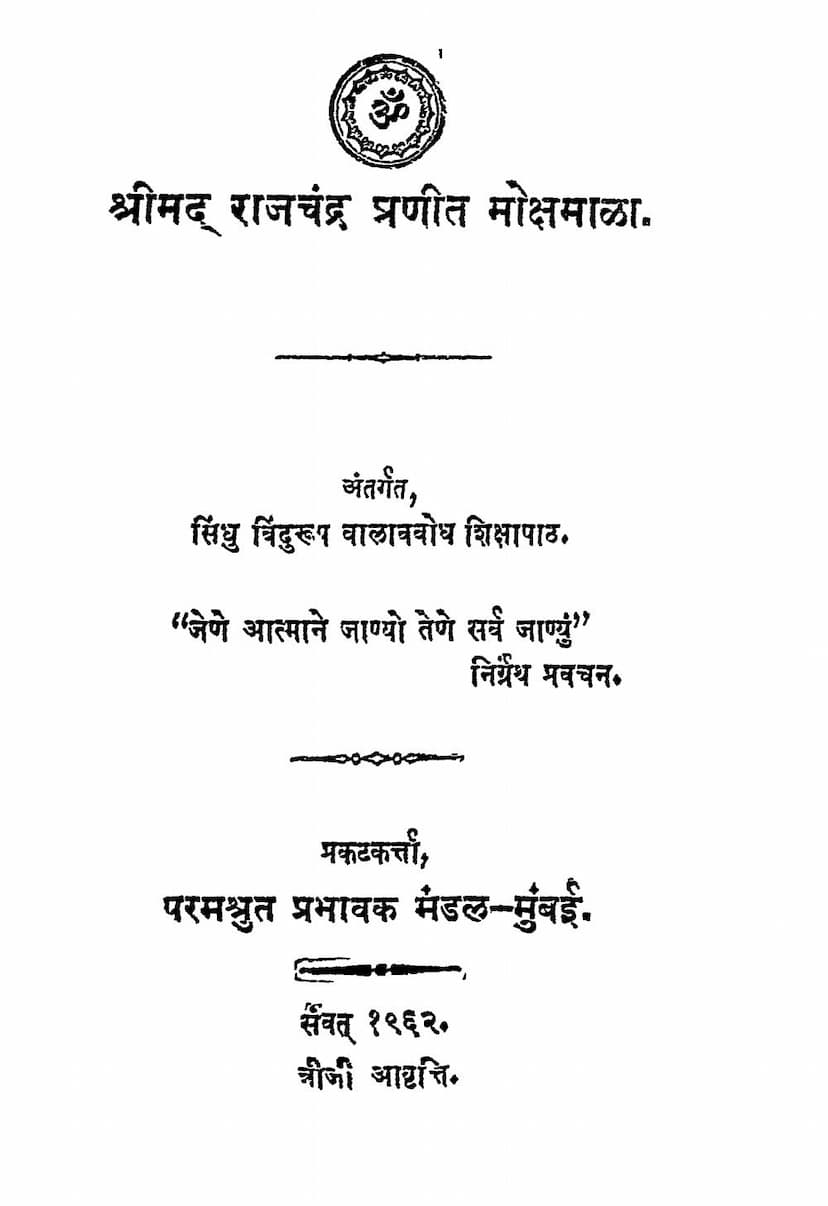Mokshmala
Added to library: September 2, 2025

Summary
The text provided is the "Mokshmala" (Garland of Liberation), authored by Shrimad Rajchandra and published by Paramshrut Prabhavak Mandal, Mumbai. It is a collection of educational lessons (Shikshapath) intended to guide individuals towards spiritual liberation. The book was first published in Samvat 1962 (1906 AD) and this appears to be the third edition.
The core message, as highlighted on page 1, is: "He who knows the soul knows everything."
The book is structured as a series of lessons, each addressing a specific spiritual or ethical concept. The table of contents (Anukramanika) on pages 3-8 reveals a wide range of topics covered, including:
Foundational Jain Concepts:
- Nirgranth Pravachan: The teachings of the Jina (liberated souls).
- Navatattva: The nine fundamental principles of Jainism.
- Samayika: Equanimity and meditation.
- Pratikraman: Retrospection and confession of sins.
- Brahmacharya: Celibacy and chastity.
- Dayā (Ahimsa): Non-violence and protection of all living beings.
- Kshamā: Forgiveness.
- Vairāgya: Detachment and renunciation.
- Dharma: Righteousness and duty.
- Samyak Darshan, Samyak Gyan, Samyak Charitra: Right Faith, Right Knowledge, and Right Conduct.
Ethical Principles and Practices:
- Vāchanārane Bhālāmaṇ: Advice to the reader.
- Manavadeh: The importance of the human body as a means to liberation.
- Karma: The law of cause and effect.
- Satya: Truthfulness.
- Satsang: Association with the virtuous.
- Parigrahne Sankocho: Restraining possessions.
- Yatana: Careful conduct and diligence.
- Rātri Bhojan: Abstaining from eating at night.
- Prajñā: Wisdom and discrimination.
- Vichār: Contemplation.
- Vinay: Humility and respect.
- Shil: Good conduct and morality.
Biographical Accounts and Examples:
- The text includes narratives of pious individuals like Kamdev Shravak, Sudarshan Seth, Sanatkumar, Kapil Muni, and Bahubali, illustrating these principles through their lives and exemplary conduct.
- Stories of devotion and the consequences of attachment, such as the teachings of Anathi Muni, are also presented.
Spiritual Path and Practices:
- Vairāgya: Renunciation and detachment from worldly affairs.
- Dharmadhyāna: Righteous contemplation.
- Jñāna: Knowledge and its various aspects.
- Moksha Sukh: The bliss of liberation.
- Manonigraha: Control of the mind.
- Satsang: The importance of virtuous company.
Philosophical Discussions:
- Sadvastu: The nature of the true and real.
- Sadgurutva: The qualities of a true spiritual guide.
- Saddharma: The true nature of religion.
- Dharmamāt Bhed: Differences in religious doctrines and the importance of understanding them with moderation.
- Sukh Vichaar: Discussions on the nature of happiness.
- Pramāda: Negligence and its consequences.
- Vivek: Discrimination between the real and unreal.
- Sāmayika Vichār: Detailed contemplation on equanimity.
- Anupam Kshama: Unparalleled forgiveness.
- Jyotish, Nakshatra, Tattva: Astronomical and spiritual principles.
- Pancham Kaal: The current era and its characteristics.
- Tattvavabodh: The awakening of true knowledge.
Key Themes and Advice: The prefaces to various editions (Pages 9-13) emphasize the importance of contemplation (manan) over mere recitation. Readers are encouraged to reflect on the teachings, understand their essence, and seek clarification from knowledgeable sources if needed. The book aims to soften the heart, sharpen intellectual capacity, and foster strong faith in Jain principles. It also stresses the need for inculcating ethical values and spiritual knowledge from a young age. The publishers express hope that this "Mokshmala" will indeed become a cause for liberation.
The text also addresses common misunderstandings and provides corrections in a "Shuddhipatrak" (Errata) on the last pages, clarifying specific interpretations of verses related to violence (e.g., with flowers) and the significance of the Namokar mantra.
In essence, "Mokshmala" serves as a comprehensive guide for spiritual seekers within the Jain tradition, offering profound insights into the nature of the soul, the path to liberation, ethical conduct, and the ultimate goal of Moksha. It encourages introspection, practice, and a deep understanding of Jain philosophy.